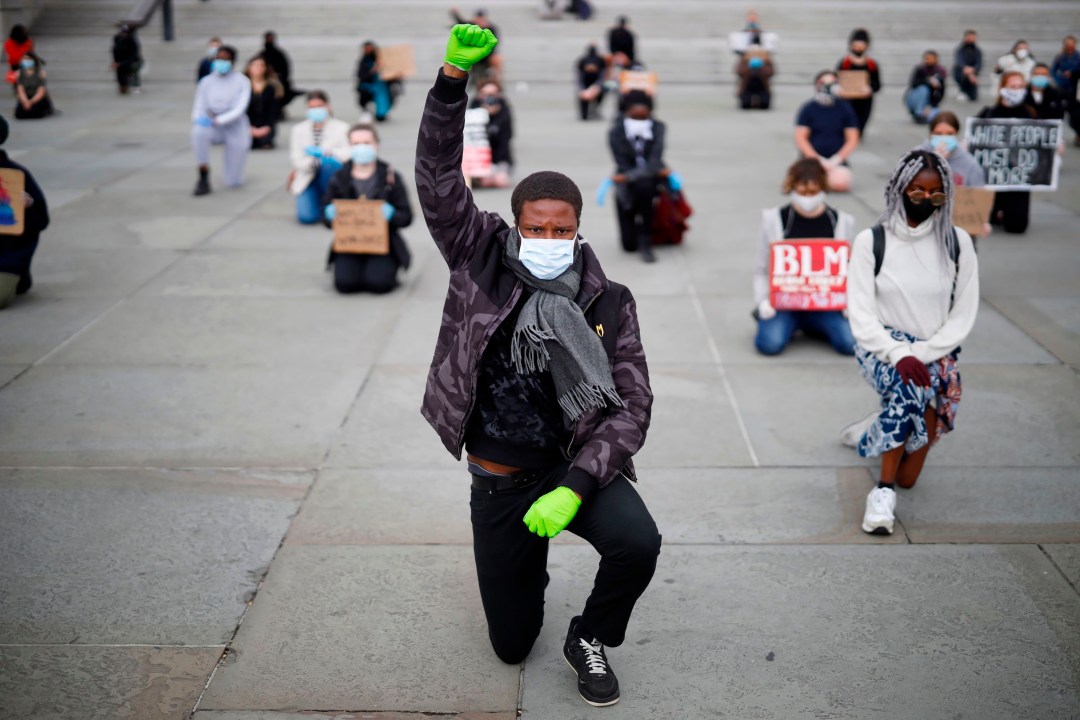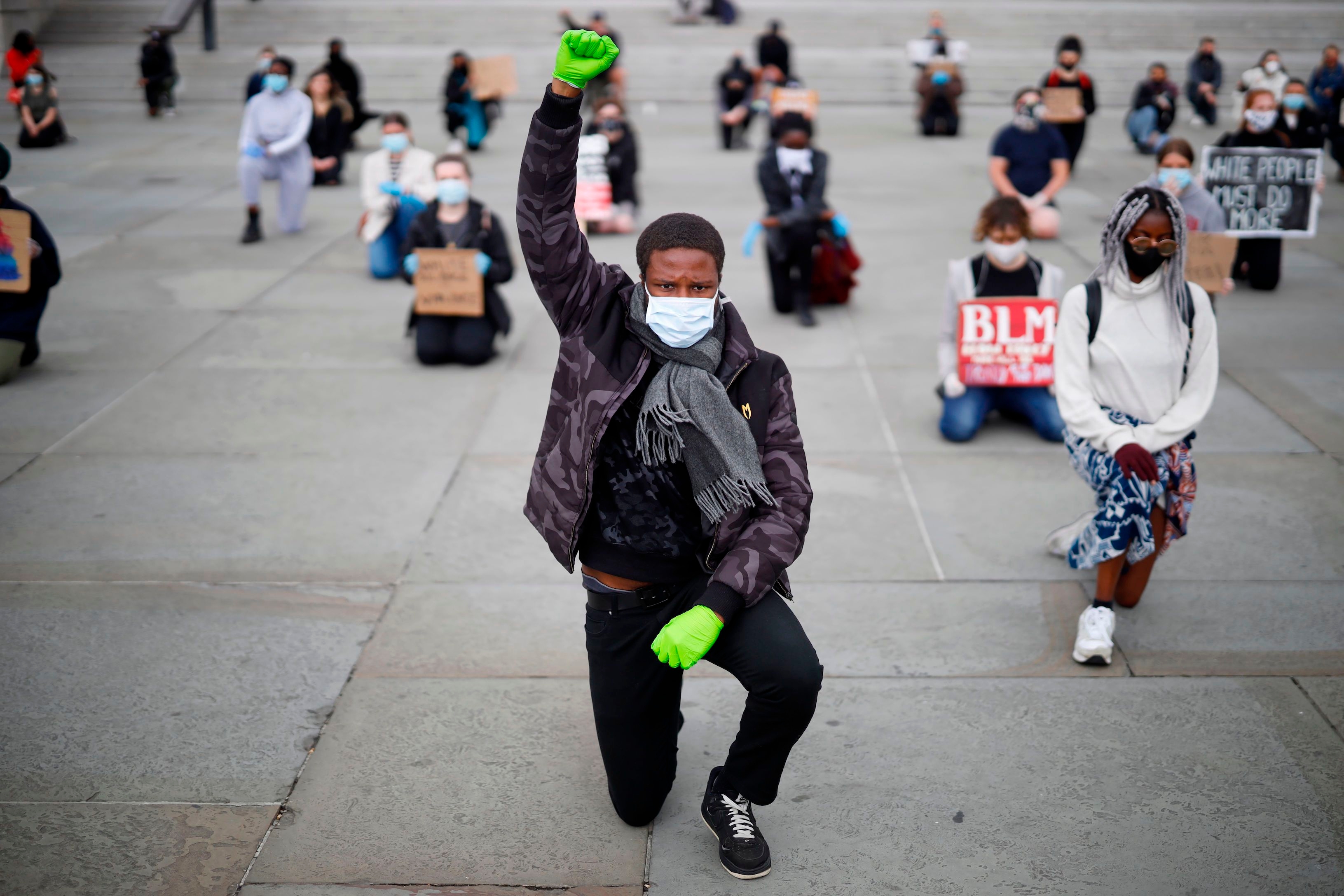What has followed the killing of George Floyd did not begin with the death of a man under the knee of a police officer. The rioting and the statue-toppling, the shunnings and the firings, the institutional genuflections and the gleeful marching through newly conquered territory are the fruits of ideas and impulses long in germination. Critics interpret these events as the work of either a political movement or a new religion, but it is more accurate to say that it is both. A secular millenarianism is trying to tear down the liberal order and erect in its place a new order that we might call coercive progressivism. It is an ideological project to enforce a progressive moral code through law, social convention and brute force, but the morality itself emerges from and satisfies a post-Christian search for meaning.
The historian Gertrude Himmelfarb died at the very end of last year but had she lived she may have been the quickest to understand our present tumult. Himmelfarb was a perceptive scholar of the Victorians and in particular their ideas about virtue, which rested, she contended, on a ‘continuum of manners and morals’. In the Victorian era, Himmelfarb observed, ‘manners were sanctified and moralised, so to speak, while morals were secularised and domesticated’. Simply put, manners were the guardrails of morality: they could not make men paragons but they could keep them within the bounds of propriety. ‘The Victorians thought it no small virtue to maintain the appearance, the manner, of good conduct even while violating some basic precept of morality,’ she explained. Their immediate intention was not saving souls but making men respectable, that more would be in with a chance of salvation.
Identity politics functions as ‘Christianity without redemption’
Salvation could take many forms. When Margaret Thatcher urged a return to ‘Victorian values’, Himmelfarb reminded the Iron Lady that fierce moralism had also fired radical movements like the Chartists and the temperance campaigners. A decade later, she would announce the emergence of ‘the new Victorians’, those progressives eager to impose updated manners and morals on matters of race, sex and sexuality. This development did not surprise Himmelfarb, for she had already noted that ‘when Christianity lost its ascendancy’, the Victorians, having nursed ‘the illusion that they could sustain morality in the absence of a religion’, came to ‘discover how tenuous, how problematic, their morality was’.
The Victorians’ zeal for moral improvement did not die with them; it was succeeded by new evangelisms that put their faith in race, class, technology, psychoanalysis and identity. What they lacked, indeed what made the Victorian ethic so successful, was respect for the individual. According to Himmelfarb, ‘the heart of Victorian morality’ was ‘self-control, self-help, self-reliance, self-discipline’. For the Victorians, ‘a liberal society… depended upon a moral citizenry. The stronger the voluntary exercise of morality on the part of each individual — the more internalised that morality — the weaker need be the external, coercive instruments of the state’. Successor projects to that of the Victorians either neglected the individual or rationalised away his moral worth or free will. They displayed the reforming ardour but not the liberal ideals of Victorian England.
Coercive progressivism is the latest incarnation of this tendency. Those currently seizing power are trying to morally improve us by regulating speech, ideas and behaviour so that we can stop replicating the sins of liberalism: racism, privilege and exploitation. They too recognise that manners can be a substitute for morality but for them lip service is not enough. They demand total compliance with their moral code. They are in the business of forced conversion.
The religious character of coercive progressivism is central to understanding its relentless, missionary vigour. Antonia Senior has observed how identity politics functions as ‘Christianity without redemption’, and the faith espoused by the coercive progressives is just such a creed, as its response to George Floyd’s killing demonstrates. There are rituals, hymns and almsgiving. In place of justice, there is martyrdom; baptisms are now conducted at the site of Floyd’s death. There is original sin in the form of ‘white privilege’ and heritable guilt. Iniquities are confessed and, by way of penance, apologies given for the actions of others and patronising genuflections made to shine the shoes of black people. Heretics are shunned or browbeaten into repenting and even the insufficiently pious are damned. Graven images are smashed by the faithful and the theology is suitably confusing, with some activists demanding white people speak up and others that they shut up. But where Christianity offers salvation, sin is eternal in this religion and the hope of deliverance absent. There is only the cross, no resurrection.

It is not always easy to separate a bad cause from the good examples it seizes upon. That many feel distress, disgust and anger at this moment is to be expected. The killing of George Floyd and the broader questions of racial injustice must be confronted and remedied. Liberalism offers just such remedies in the form of courts, elections, debate and policy changes. The pace of justice can be achingly slow, and the destination sometimes never reached, but in the reaching for it there is the hope for progress. True progress is organic; it is a negotiation, not an imposition. It cannot be achieved by rioting, censoring, bullying or destroying.
Anyone interested in cultivating new manners and morals about race should learn from the Victorians’ example. By ‘secularising’ and ‘domesticating’ morals, by making the spiritual mundane through the architecture of manners, they built social conventions practised faithfully by many who did not share or were unaware of their philosophical underpinnings. This they achieved by elevating the individual as a moral being, not subjecting him to the caprices and cudgels of the mob. A liberal society with individual conscience and dignity at its heart is not a hindrance to virtue but an essential foundation. Coercive progressivism is the morality of a fanatic and the manner of a tyrant.








Comments